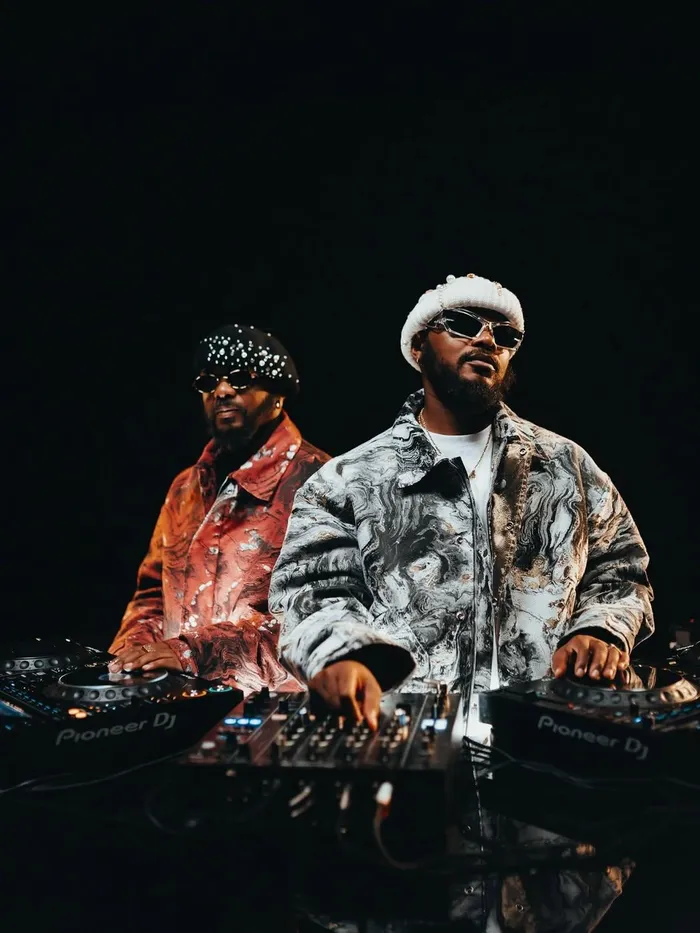SA podcast culture under fire: Major League DJz call out clout-chasers

Major League DJz have waded into the podcast culture debate - and they're not holding back.
Image: Instagram
South Africa's dynamic music duo, Major League DJz, have stepped into the growing debate around podcast culture - and they’re not holding back.
Taking to X, the twins voiced their frustration at the direction many local podcasts have taken.
“These podcasts are getting out of hand now … People are just saying things for reactions and trends. SMH,” they wrote.
The comment, though brief, echoed a growing sentiment across social media platforms: that some podcasts are prioritising controversy over meaningful content.
Their remarks came amid intense backlash directed at the “Open Chats Podcast”, which found itself at the centre of public outrage after airing a discussion riddled with derogatory commentary about coloured people.
The firestorm began when one of the hosts made an offensive claim: “Apparently, coloured siblings chow each other,” referencing a deeply harmful and baseless stereotype.
Another host doubled down on the insensitivity, casually labelling coloured people as “crazy” - a conclusion she drew from her own dating experiences.
The remarks sparked immediate and widespread condemnation. For many, it was yet another example of how podcast platforms are increasingly being used to push inflammatory content under the guise of "keeping it real".
Enter Major League DJz, whose post instantly went viral. Supporters applauded their callout, saying it was high time that influential figures addressed the issue.
“Facts! People are no longer having real conversations. It’s all about being the next trending topic,” one user replied.
Another added, “These platforms used to give us access to real, meaningful insights from people we admire. Now it’s just noise for clout. Respect to Major League for speaking out.”
But the DJs’ criticism didn’t sit well with everyone. Detractors accused them of hypocrisy, saying they’ve also chased trends - particularly in how they’ve jumped from genre to genre in the music space.
“You don’t hear us complain when you jump on whatever genre that’s popping,” one critic wrote. “You ride the wave of whatever’s hot, so why can’t podcasters do the same?”
Some also felt the duo was misdirecting their outrage. One post read: “One thing about South African celebrities, when the country is in crisis, they’re quiet.
"But let someone say something dumb on a podcast, and suddenly they have opinions. And besides that, broer said ‘apparently’ - now you want to cancel the whole podcast?”
Despite the division, the moment has sparked a broader conversation about accountability in media spaces.
Podcasts have become a dominant force in South African digital media - offering a platform for unfiltered expression and alternative narratives often absent from mainstream outlets. But with that freedom comes responsibility.
As one user put it, “There’s a fine line between being honest and being reckless. Some of these podcasters think being controversial equals being brave, but they’re just being harmful.”
Others pointed out that while podcasts do push boundaries, they also play a crucial role in allowing underrepresented voices to be heard.
“We can’t paint all podcasts with the same brush,” one comment read. “Yes, some are messy, but others are doing the work - documenting culture, challenging norms and having the hard conversations that mainstream media avoids," another said.
While “Open Chats Podcast” finds itself in the spotlight, it’s not the only show drawing national criticism.
“Podcast and Chill with MacG”, one of South Africa’s most popular - and controversial - podcasts, has faced repeated backlash for its treatment of gender, sexuality and public figures.
In a recent episode, hosts discussed TV personality Minnie Dlamini’s breakup with plastic surgeon Dr Brian Monaisa. During the segment, MacG crudely questioned why Dlamini “can’t keep a man” and went as far as to speculate about the state of her private parts.
Although he later apologised, claiming he had no intention to offend, the fallout was severe. Dlamini has since filed a R2.5 million Equality Court claim against hosts MacGyver “MacG” Mukwevho and Sol Phenduka, citing hate speech, harassment and gender-based discrimination.
As Mzansi’s podcasting scene continues to evolve, so too does the conversation about its role - and its responsibilities.
Whether they’re offering cultural insight or chasing controversy, one thing is clear: the podcast space is under the microscope.
Related Topics: